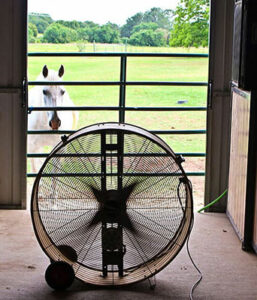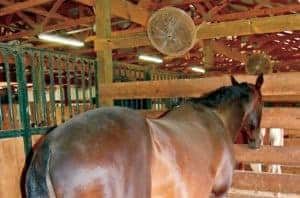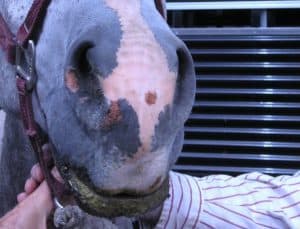
How to Help Your Horse Avoid Heat Stress This Summer
Follow these steps to keep your horse cool and comfortable in the heat.

Follow these steps to keep your horse cool and comfortable in the heat.

Our equine nutritionist and physiology expert offers advice on managing horses that have stopped sweating.

High temperatures and humidity can make caring for horses a challenging endeavor.

With Oktoberfest in full swing, we started to wonder: Is the racetrack tradition of giving horses beer a good idea?

Learn to recognize the signs of various temperature-raising conditions in horses.

Horses with anhidrosis don’t produce an adequate amount of sweat. Here’s what to know about this condition.

Learn more about this potentially dangerous condition in horses and how to manage it.

Researcher found that three commonly used macrolides suppressed foals’ normal sweat responses to varying degrees.

Anhidrotic horses don’t sweat well or at all, which can be dangerous in warm climates. Here’s what to watch for.

What are some signs that a horse has overheated?

Complicated and emerging equine skin disorders do exist, but they are rare, according to one researcher.
Horse can develop anhidrosis, or non-sweating, at any point in their life, regardless of breed, age, or sex. Horses living in hot and humid climates are known to be at greater risk. The Sanctuary Equine Sports Therapy & Rehabilitation Center, located
Latherin, a soaplike protein in horse sweat and saliva, helps spread sweat over the coat, maximizing evaporation of water for heat loss, and causing the foam that we see when horses sweat profusely. Latherin is also found in saliva, which might
Despite the fact that 20% of racehorses in the southern United States are affected by anhidrosis–the inability or decreased ability to sweat–the underlying causes of this medical condition remain unknown.
Sweating is the primary mean
Florida researcher Robert MacKay, BVSc, PhD, Dipl. ACVIM, professor in the Department of Large Animal Clinical Sciences at the University of Florida, has developed a new means of assessing and quantifying quantifying clinical signs of horses tha
Results of a study performed by scientists at Glasgow Caledonian University and Michigan State University have revealed that the sweat glands of anhidrotic horses secrete chloride ions differently than normal horses–these chloride ions underpin the
Stay on top of the most recent Horse Health news with
© 2022 Copyright Statement dolor sit amet, consetetur sadipscing User Terms, sed diam nonumy eirmod tempor invidunt ut labore et dolore magna aliquyam erat, sed diam voluptua. At vero eos et accusam et justo duo dolores et ea rebum. Stet clita kasd gubergren, no sea takimata sanctus est Lorem ipsum dolor sit amet.
"*" indicates required fields